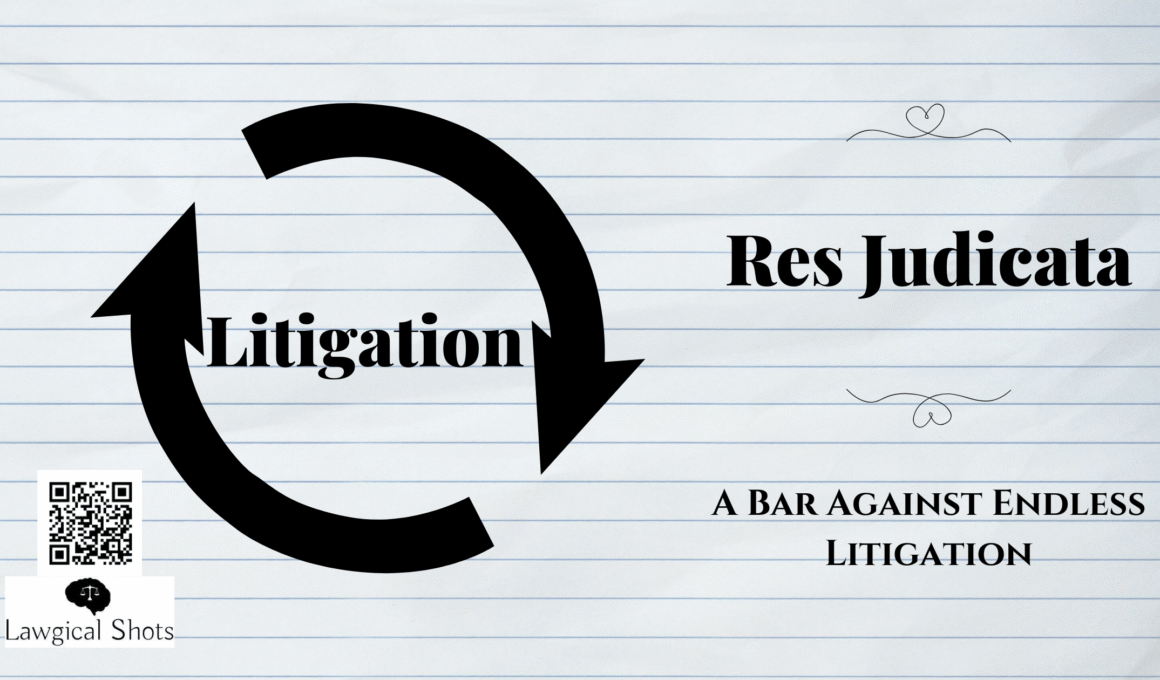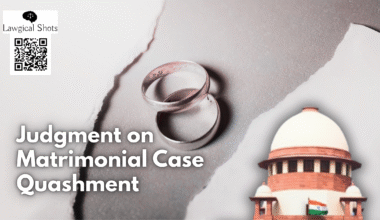Imagine a world where legal disputes could be reopened again and again, even those already decided by courts, just because one party wasn’t satisfied. Absurd right? To prevent this endless cycle of litigation, the law introduces the doctrine of Res Judicata.
Meaning of Res Judicata
Literally speaking, res judicata is a thing or matter already decided or adjudged. “Res” means a thing or matter and “Judicata” means adjudged or decided. Section 11 of the Code of Civil Procedure lays down the principle of res judicata. It states that once the matter is decided by the competent Court on merits, the same matter cannot be agitated by the same parties again. In other words, a matter decided by a competent court cannot be reopened again or open to litigation again.
It is necessary for the interest of justice if there is absence of such principle there will be no end to litigation. This principle is designed to secure public interest by reducing litigation pollution and the individuals from harassment of having to litigate on the same cause of action more than once.
Res Judicata under Section 11 CPC
- The plea of res judicata is a plea of law which determines the jurisdiction of a competent court. But this provision is only limited to civil suits. It has no application on criminal cases.
Also read the difference between Criminal and Civil Law
- It is the duty of the parties to bring the matter to the notice of the court; if they fail to do so, it will be presumed that they have waived the plea of res judicata.
- If the subsequent suits had any following
(i) Same matter
(ii) Same parties
(iii) Same title
(iv) Already decided by a competent court
(v) On merits
Such a suit will be barred under the principle of res judicata.
Essence of Res Judicata
The doctrine of res judicata is based on three maxims:
(i) Nemo debet bis vexari pro una et eadem causa → which means no person should be harassed twice for the same wrong.
(ii) Interest reipublicae ut sit finis litium → which states that there should be end of litigation for the interest of the public.
(iii) Res judicata pro veritate accipitur → means judicial decision must be accepted as correct.
Thus, pointers (i) & (ii) above are related to public policy and (iii) is related to private policy.
Conditions of Res Judicata
For the applicability of this provision the following condition must be satisfied:
- The matter directly and substantially in issue in the subsequent suit must be the same matter, which has been decided in the former suit.
- In subsequent suits a party must be the same or their representative, in the former suit decided
- Such Parties must have been litigating under the same title in the former Suit
- The former suit should be decided by competent court
- Issue raised in subsequent suit must be finally decided in the former suit (not include the interim orders)
Explanations to Section 11 CPC
- Explanation I (Former suit) :- It defines the meaning of former suit, denotes a suit decision has been decided prior to the suit in question, no matter whether it was instituted prior or not.
- Explanation II (Competency of Court) :- By this provision, competency of the court shall be determined, whether or not such decision has a right to appeal.
- Explanation III (Matter in Issue) :- It states that if a matter in the former suit has been alleged by one party and either denied or admitted by the other party, cannot be raised again at subsequent suit.
- Explanation IV (Constructive Res Judicata) :- This provision expands the scope of matter directly and substantially in issue. It states that adjudication is conclusive & final not only as to the actual matter determined but as to every other matter which the parties might and ought to have litigated or essentially connected with the subject matter. In other words, when a person fails to raise a ground in a former suit as an actual ground, he cannot raise or in a subsequent suit. It will be barred as constructive res judicata.
Workmen v. Board of Trustees, Cochin Port Trust, 1978
The Supreme Court explained the principle of constructive res judicata as “When any matter which might and ought to have been made a ground of defence or attack in a former proceeding but was not so made, then such a matter in the eye of law, to avoid multiplicity of litigation and bring about finality, it is deemed to have been constructively in issue and therefore is taken as decided.”
For example: A sues B for possession of property on the basis of ownership. The suit is dismissed. A cannot thereafter claim possession of property as mortgagee as that ground ought to have been taken in the previous suit as a ground of attack.
- Explanation V – (Relief not granted deemed refused) :- This explanation determines that if the plaintiff claims certain relief and the court does not grant the same, it is deemed that the court has refused it. The same relief cannot be claimed again in another suit.
- Explanation VI – (Representative Suit) :- This explanation states that if a suit is filed by any representative (In case of public and trust matters) is decided on merits, then such a decision binds all those who are represented in the suit. For example, if a trustee files a case concerning trust property and wins, another beneficiary cannot reopen the same issue in court later.
- Explanation VII – (Executive Proceeding) :- This provision states that res judicata will also apply in execution proceedings. In execution proceedings in which the court already determined that the decree or order of the court be enforced and carried into effect. This means that if a matter has already been decided by the competent court in case of execution of a decree, the same cannot be re-agitated in another execution application.
- Explanation VIII – (Courts of limited jurisdiction) :- This provision determines that even if a court of limited jurisdiction (like revenue court or small causes court) decides an issue, its decision will still operate as res judicata.
Find out what Res Ipsa Loquitor means
Exceptions to the Principle of Res Judicata
While the doctrine of res judicata seems to be precise and unquestionable, there are some exceptional cases when relitigation may be allowed. The same has been addressed by the Apex Court itself.
Raju Ramsing v. Mahesh Deorao Bhivapurkar, 2008
In this case, the Supreme Court laid down the following exceptions to the rule of res judicata
- When the judgement is passed by the court, and that court is not competent or doesn’t have a jurisdiction to entertain the case
- When the matter raised in subsequent suit involved a pure question of law.
- When judgement given in former suit has been obtained by committing fraud on the court
- The Res judicata is not applicable when the cause of action is different in subsequent suit from the former suit
- In case of Interlocutory order res-judicata will not apply as such order are not final in determination of the issue
- If in case, a party waives the right of res-judicata, they cannot raise it in subsequent proceedings.
Conclusion
The doctrine of Res Judicata ensures finality in litigation by preventing the same issues from being re-litigated between the same parties. It ensures judicial discipline, saves time, and protects parties from unnecessary harassment. By barring repeated suits, it strengthens the principle that there must be an end to litigation and promotes certainty in the administration of justice.
The principle of Res Judicata has been simplified by our intern, Ms Himani Gill. She has been assisting the team in bringing informational legal blogs.








